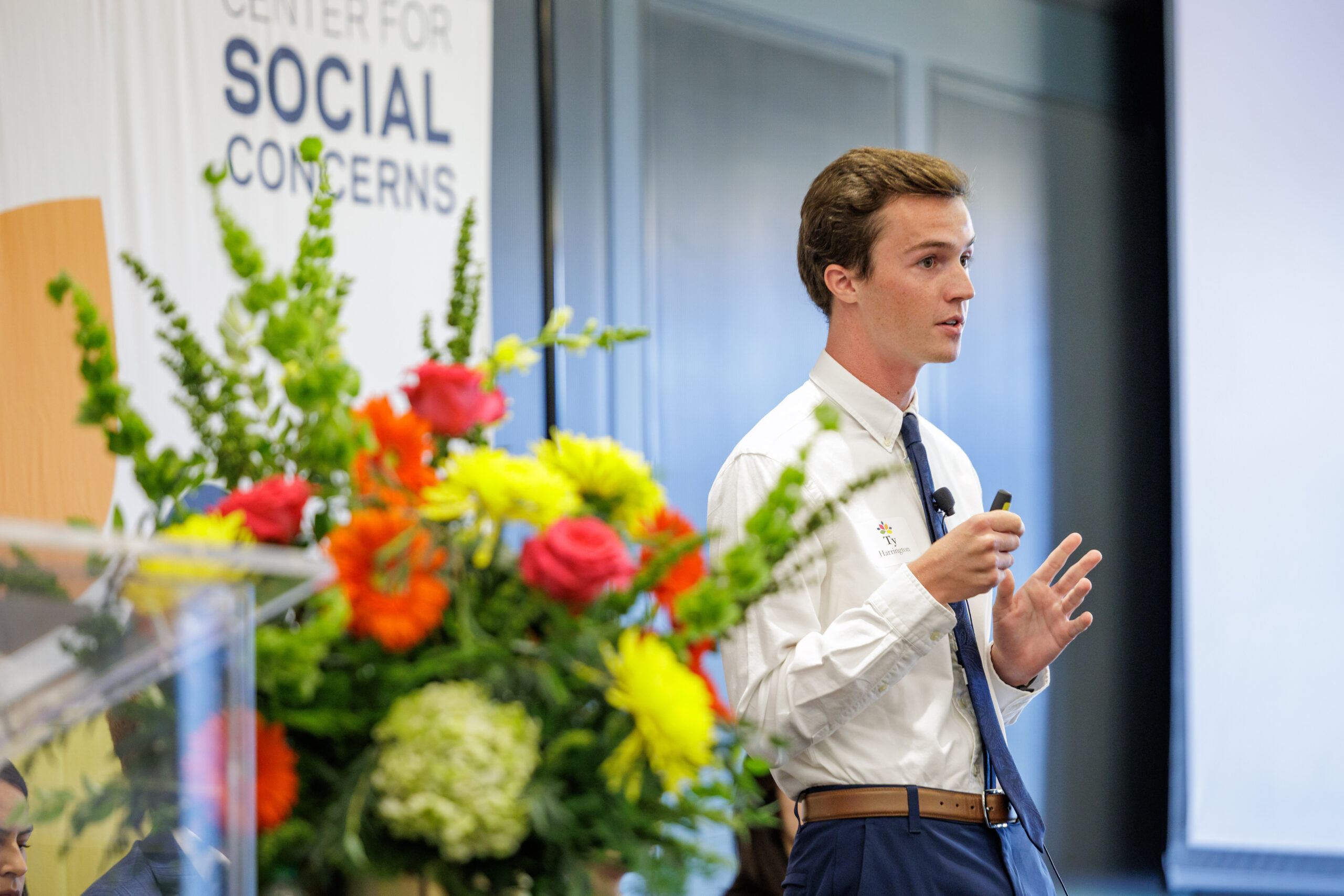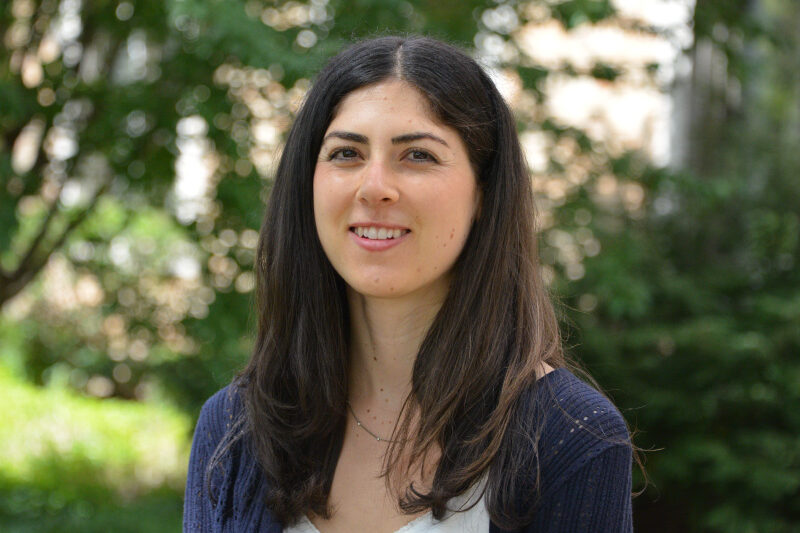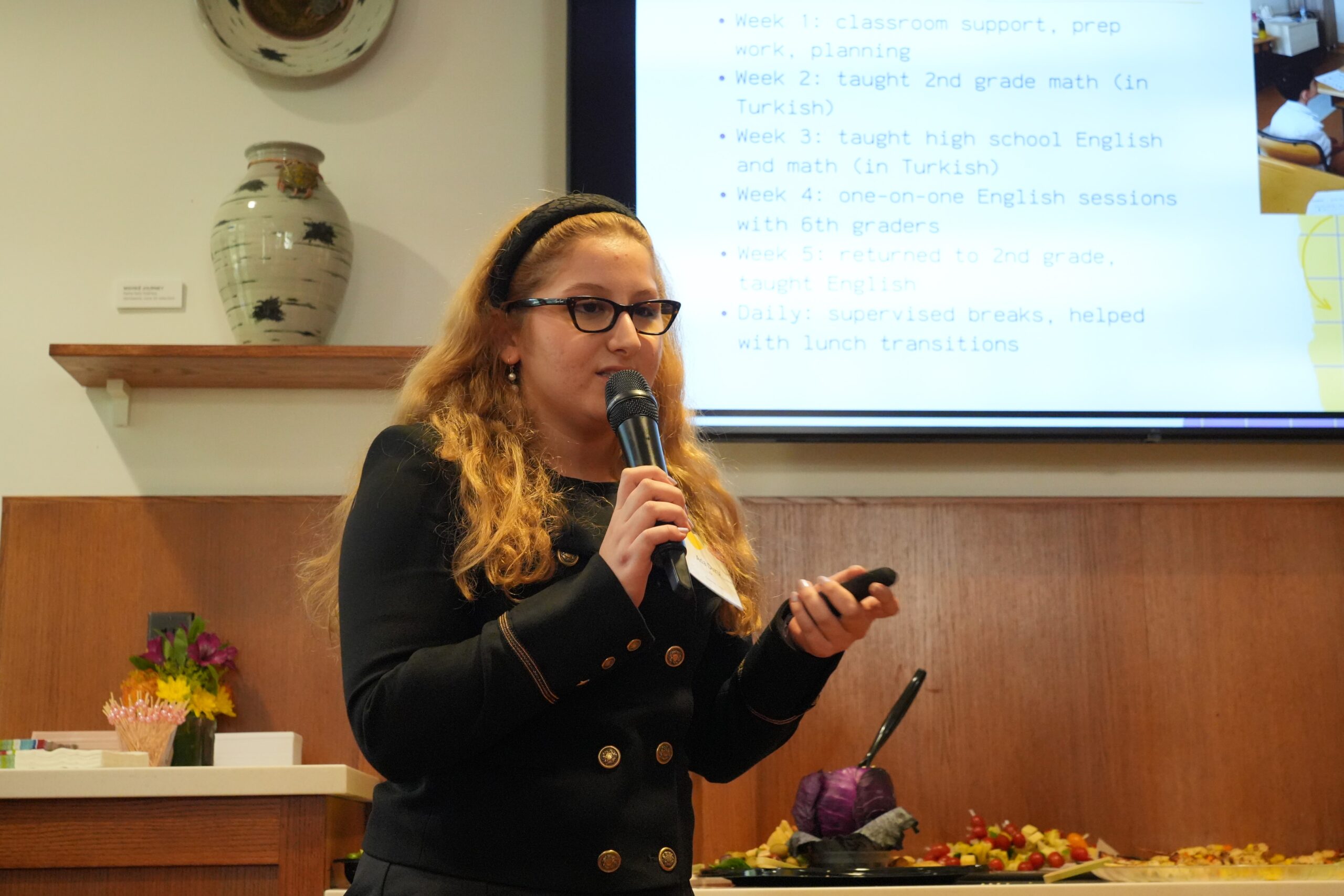Catalyzing collaborations with South Bend citizens for the common good
Institute launches South Bend Citizens Collaboratory
August 25, 2025
For the first time in Notre Dame’s history, its strategic framework includes engagement with South Bend and the region. After describing how the University is investing in and engaging with the city, it states that “the promise of these efforts depends on building genuine partnerships with local governments, companies, schools, and other nonprofit organizations.”
The Institute for Social Concerns has long been at the forefront of efforts to build genuinely reciprocal, mutually enriching partnerships with members of the city and region. Now, emerging from these partnerships, the institute is launching the South Bend Citizens Collaboratory—a home for individuals and organizations committed to the flourishing of our shared community of South Bend.
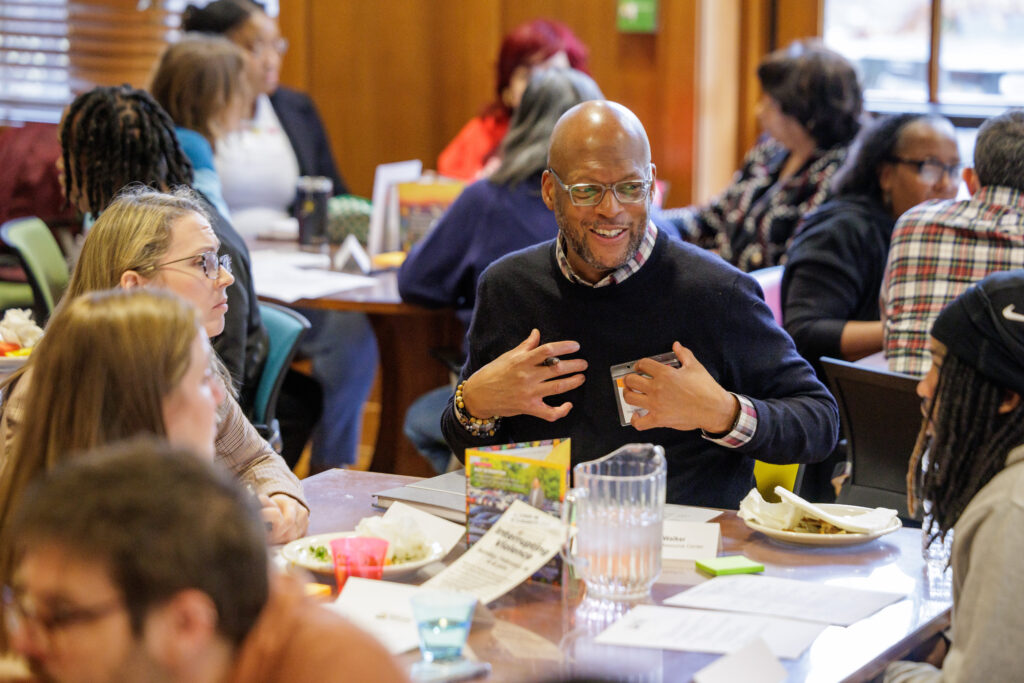
The Collaboratory brings together the wisdom, experience, and learned expertise of South Bend civic leaders with the research and disciplinary expertise of Notre Dame faculty in order to cultivate long-term, impactful partnerships in service of justice. Grounded in Catholic social tradition, it is deeply relational, dignity enhancing, and community centric—with specific projects emerging from longstanding relationships and shared commitments between South Bend stakeholders and University faculty.
“The Collaboratory serves as another step aligned with the focus of the University’s strategic framework on South Bend and the local region,” said Suzanne Shanahan, the Leo and Arlene Hawk Executive Director of the institute. “It will ensure that our research continues to be put into service of the common good and the flourishing of our shared community for years to come.”
The Collaboratory’s work involves three interconnected elements: a research hub, story lab, and leadership forum. Together these elements work to advance ways that South Bend and all of its residents can thrive.
Research Hub
The research hub develops a community-driven research agenda, serving as an incubator for public scholarship that identifies and responds to questions of justice in South Bend. Through the hub, Notre Dame faculty can participate in immersive experiences throughout city neighborhoods to engage residents directly impacted by pressing issues like housing, labor, and migration—setting these issues in their historical and social context. In this way, the research agenda is set by residents and South Bend partners.
The research hub also convenes residents and University faculty to build relationships, examine local issues identified in neighborhood listening sessions—like education, food security, housing, and violence—and explore possibilities for collaborative research and response. These convenings are curated by issue and the corresponding expertise of faculty and civil leaders alike. The research hub not only fosters connections among participants but also facilitates the identification of evidenced-based best practices to shape structures and inform policies.
Following a recent South Bend: Questions of Justice convening on education, professor of sociology Mark Berends remarked, “The institute was able to get the right people in the room, people who have been working on these issues for decades at Notre Dame and in South Bend but may have never before met.” He added, “This work fills me with hope that together we will be able to improve educational outcomes in South Bend.”
“This work fills me with hope that together we will be able to improve educational outcomes in South Bend.”
Building on the success of last year’s series of convenings, this fall the Collaboratory is assembling a working group of faculty in the schools of architecture, business, and law to work alongside city government, community development corporations, and small businesses to research how South Bend can pursue “development without displacement.” They will pilot a case study along the Lincolnway West corridor in South Bend to develop affordable housing solutions, new business incubation, and urban agriculture.
Story Lab
The story lab celebrates South Bend citizens who are pursuing the common good by telling local stories through creative and historical writing, performance, and visual arts. With large-scale public arts projects, semester courses, and workshops, scholars and citizens promote creative storytelling that recenters vulnerable populations that have been moved to the margins. Creative projects are led by both University and local writers and artists, while trainings provide students and residents the research methodologies and artistic skills to contribute to these productions.
To promote storytelling for the common good, the institute hosts workshops on campus, in neighborhoods, in schools, and in carceral facilities. In cultivating an attentiveness to the dignity of the marginalized and developing avenues of expression for such populations to share their history, culture, and identity, the story lab provides a platform for encounter and fosters dialogue between campus and city residents.
“Our collaboration with the Institute for Social Concerns over the decades has empowered us to celebrate the story of our Latino community’s journey and successes through art—from organizing for migrant farm workers to the founding of La Casa de Amistad,” said Juan Constantino, chief executive officer at La Casa de Amistad in South Bend. “I look forward to the ways the Collaboratory will deepen the bonds between the University and South Bend’s Latino community in the years to come.”
“I look forward to the ways the Collaboratory will deepen the bonds between the University and South Bend’s Latino community in the years to come.”
Expanding this work, the Collaboratory is partnering with Dismas House this fall on a mural arts research project engaging the process of reentering society from incarceration. Notre Dame faculty and students will work alongside returning citizens in South Bend to explore the structural challenges to their transition, share their stories of resilience and courage, and translate their narratives into visual language that will be told through the creation of mural on the exterior wall of the new Dismas Reentry Hub in downtown South Bend.
Leadership Forum
The leadership forum cultivates civic leaders across academia, government, industry, faith communities, and neighborhood associations by providing them with tools that promote flourishing. Engaging long-term residents, newcomers, migrants, and returning citizens alike, the leadership forum facilitates convenings, workshops, and training to connect individuals and populations across sectors to cultivate trust, build capacity, increase access, and mobilize resources through ever-expanding networks.
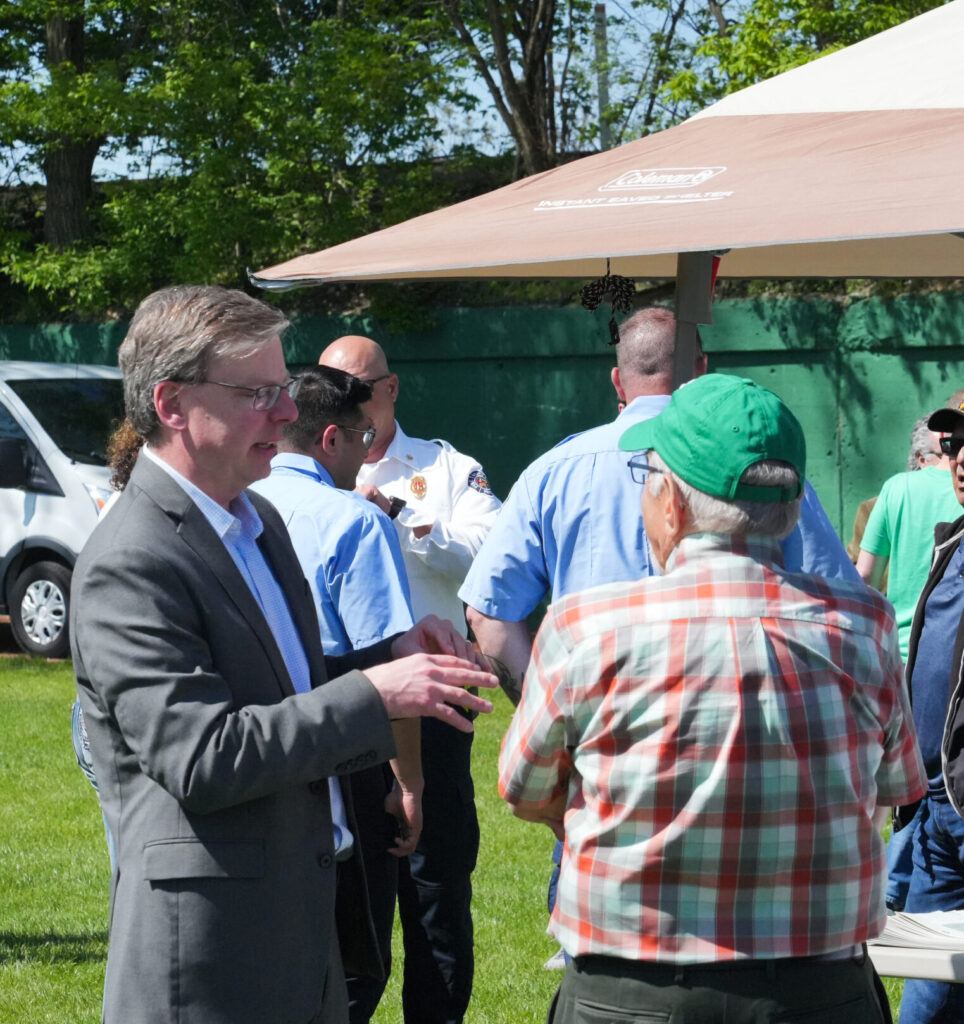
Through the leadership forum, South Bend residents gain conceptual knowledge and practical skills to complement their already acquired wisdom and expertise from lived experience. Working with scholars and practitioners equips participants to engage more fully in civic life and to work across differences of background, experience, and political perspective. By participating in the leadership forum, residents not only grow in their individual agency but also develop relational commitments to shape the decisions that impact the daily realities of their respective environments. Through this approach, the Collaboratory champions subsidiarity and recognizes each of its collaborators as an integral contributor to building their respective communities, leading to the thriving of South Bend as a whole.
“Since joining Notre Dame, I’ve had the privilege of collaborating with key community partners, and I view having close collaborations with my community as essential to my work,” says Collaboratory advisory council member Karla Badillo-Urquiola, the Clare Boothe Luce Assistant Professor of Computer Science and Engineering and director of the EPOCH Research Lab. “I am excited for the ways the Collaboratory will deepen community partnerships and ensure that our research continues to create solutions that meet real-world needs in the South Bend community.”
“I am excited for the ways the Collaboratory will deepen community partnerships and ensure that our research continues to create solutions that meet real-world needs in the South Bend community.”
The Collaboratory will be kicking off the school year by convening scholars and community leaders for an Everyday Democracy conference, co-sponsored by the Cushwa Center and made possible with generous funding from the Democracy Initiative. The conference will include a public keynote by Luke Bretherton, the Regius Professor of Moral & Pastoral Theology at the University of Oxford and a Canon of Christ Church Cathedral. This will be the first of three annual convenings bringing together scholars and civic leaders to facilitate research projects that enrich and deepen our understanding of the practices and theories of democratic participation.
To get connected with the Collaboratory or receive more information, contact Michael Hebbeler, assistant director of community partnerships and programs, at hebbeler.2@nd.edu or 574-631-5779.
Advisory Council
Karla Badillo-Urquiola, the Clare Boothe Luce Assistant Professor, College of Engineering; director, EPOCH Research Lab
Kathy Burnette, founder and chief executive officer, Brain Lair Books
Juan Constantino, chief executive officer, La Casa de Amistad
Marianne Cusato, professor of the practice, School of Architecture; director, Housing & Community Regeneration Initiative
Allie Dolz-Lane, deputy chief of staff, South Bend mayor’s office
Marya Lieberman, the Nancy Dee Professor of Cancer Research, Department of Chemistry & Biochemistry
David Martin, artist, citizen of the Pokagon Band of Potawatomi
Jose “Hameem” Otero, director of resident life, Dismas House
Dion Payne-Miller, organizing fellow, We Make Indiana
Alfonso Pedraza-Martinez, the Greg and Patty Fox Collegiate Professor of IT, Analytics, and Operations, Mendoza School of Business; director, Humanitarian Operations Lab and Meyer Family Business on the Frontlines
Roy Scranton, associate professor, Department of English; director, Environmental Humanities Initiative (EHUM)
Paul Winters, associate dean for academic affairs; Keough-Hesburgh Professor of Sustainable Development, Keough School of Global Affairs
Related Stories
-
Social Concerns Summer Fellow returns to India for ongoing research
-
ReSearching for the Common Good: Solbee Kang
-
Bridging worlds through art—Kyla Walker joins institute as international poetry justice fellow
-
The power of encounter—RISE Hometown prepares incoming students for learning in service of justice at Notre Dame
-
The beauty of everyday democracy—Institute convenes scholars, practitioners, Luke Bretherton for democracy conference

